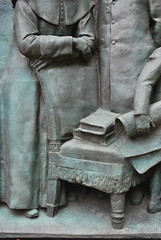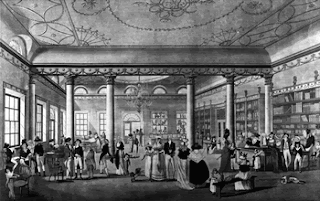
As regular readers of this blog know, I love biographies, especially of favorite writers. That's not because I feel a writer's work needs the context of his life in order to be fully understood but because, being interested in the writing, I'm interested in the talent that underlies it--and thus interested in the life and circumstances that created that talent. (In addition, I'm not ashamed to admit that I whole-heartedly love literary gossip.) And though I've often been surprised to find closer connections between a life and work than I expected--the charismatically malevolent characters in
Iris Murdoch's novels, for example, can be mapped pretty closely to such figures in her own life (including the most malevolent of all,
Elias Canetti)--I'm almost always able to keep the two separate when I return to the work, and thus I almost never regret learning more about a writer's background.
But I fear that I've found the exception. This week, as I blazed through the four novels collected in the Library of America's new
Philip K. Dick volume,
Four Novels of the 1960s (
The Man in the High Castle (1962),
The Three Stigmata of Palmer Eldritch (1965),
Do Androids Dream of Electric Sheep? (1968), and
Ubik (1969)), I found myself wishing I could return to the moment when I was sixteen and opened my father's copy of Dick's first published sci-fi novel,
Time Out of Joint (1959). I knew nothing of Dick or the novel except that my father liked it and that it was strange (the paperback I read, however, sadly did not carry the tag line that the Lippincott first edition hardcover did, "A Novel of Menace").
Strange it definitely was, in a way wholly different from the sci-fi that I'd read up to that point, which consisted of
Asimov,
Arthur C. Clarke,
Ray Bradbury, and a scandalously large number of
Star Trek novels. Those writers for the most part worked the "what if" that is a sci-fi writer's inspiration on a grand scale, at the level of universes.
Time Out of Joint, on the other hand, opens at the level of the human, on what is recognizably our earth, with a simple moment of confusion: a man reaches for the light pull in his closet but is unable to find it, and after a time he realizes that there's no pull at all--the light is controlled by wall switch. A small mistake, but it gnaws at him, and soon he's finding other elements of his world to be ever-so-slightly askew.
It's a flawless opening, because it draws the reader in with an experience that is utterly familiar, even commonplace. We all know those moments, from deja vu to the momentary pixilated fog of waking from a deep sleep, where our world seems not quite right, like a gear has slipped and allowed us to glimpse, however briefly, the machinery quietly humming along in the background. As Joe Chip in
Ubik says as he stands in his office,
I can't put my finger on it, but things are different.
But in our lives, things
aren't really different, and we don't, of course, take those moments seriously; we know that they're caused by misfiring neurons or by our minds' inherent desire to discern patterns in the chaotic impressions that perpetually bombard it. We're confident that reality is as we see it, essentially, so we pour our coffee and move on.
Dick asks us, instead, to shed our usual blithe acceptance and instead confront those inexplicable moments on their own terms. Might these hiccups in reality that we accept as internal events, products of our own brains, instead be actual disjunctions, even signs or warnings? Might they be indications that all is not well? What if the reality we see right now isn't the reality that was there mere moments ago? (
John Crowley rings a change on this theme in
his Aegypt cycle.) What if our memories are not our own? Then, the ominous question that inevitably follows: who might be manipulating our perceptions, and to what end?
It's a captivating conceit--especially for the sixteen-year-old me, just discovering metaphysics--and it's one that turns up again and again in Dick's work. His variations on it are inventive and exciting, and he employs this slippage to produce effects ranging from comedy to suspense to full-throated horror (some moments in
The Three Stigmata of Palmer Eldritch are truly terrifying). For all the efforts of thinkers from Descartes on, we can't, after all, prove that we're right about reality, and a convincing explanation of what Oz the Great and Terrible might be up to behind all those painted canvas backdrops is thus always going to be compelling.
As a teenager, I admired Dick's inventiveness and his relentless attack on that concept, but as I grew older and learned more about Dick's life, it became tougher and tougher to enjoy. Dick, as seemingly every literature fan knows by now, was for much of his life a drug-addled paranoiac on the verge of mental breakdown; fueled by the legal pharmacological bonanza of the late '50s and early '60s (and the illegal one that flourished in his hometown of San Francisco in the latter decade), he was haunted by visions, deep-rooted fears, and an unshakable sense that, beneath the facade of everyday life, there really were answers and explanations.
In part because of the drugs and mental problems, Dick's was not a long life, and it seems not to have been a happy or particularly pleasant one, despite his accomplishments and his many friendships. And now I find it hard to totally banish that knowledge when I read his books. What I enjoyed before--the slithering visions of menace that penetrate
The Three Stigmata of Palmer Eldritch, the cryptic messages that drive the action in
Ubik, or even the innocent dislocation that jars
Time Out of Joint into motion--are irreversibly suffused with an extra-literary menace.
In a sense, whereas before, Dick and I were playing particularly inventive and fun "what-if" games together, games which we would lay aside at the closing of the book, restoring reality to its rightful place, this week when I read his novels, I couldn't ever quite escape the fear and worry Dick's characters were experiencing. How much of his own fear and worry was fueling the emotions of his characters? How much of these conceits that he would, I'm sure, overtly claim as invention did some part of his fragmented psyche actually believe--and have to live through? How much of the content of these novels is based in invention, and how much is based in actual suffering?
Maybe this is an inappropriate response--drawing one-to-one parallels is the job of the biographer, after all, not of the reader, and falling into that trap can greatly diminish a work. Maybe I'm being unfair to Dick; maybe, even as I praise his creativity, I'm insulting it by even suggesting that the air of paranoia and uncertainty he creates is anything but intentional and separate from his life. The alchemy of creativity is secret and strange in even the most ordinary-seeming writers, and direct attribution or explanation is liable to be wrong at least as often as it's right.
Intellectually, I know that for all my love of biography I'm a better reader when I can make that break, separating the biography and the work--and maybe in the future, in Dick's case, I will be able to. But this week, on this reading, his novels carried an air of pathos that, while leaving them no less arresting, rendered them something far different from entertainment or literature.




